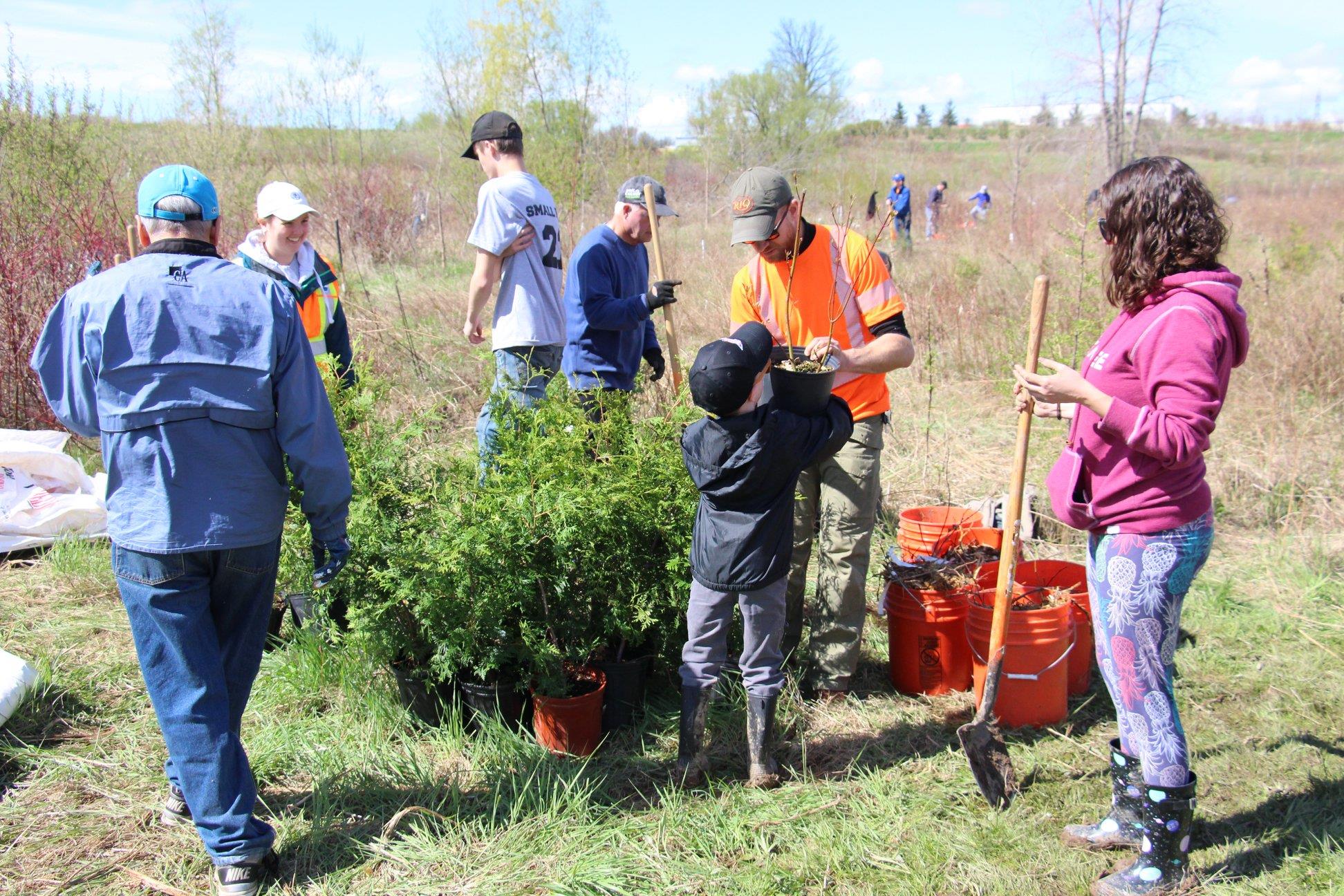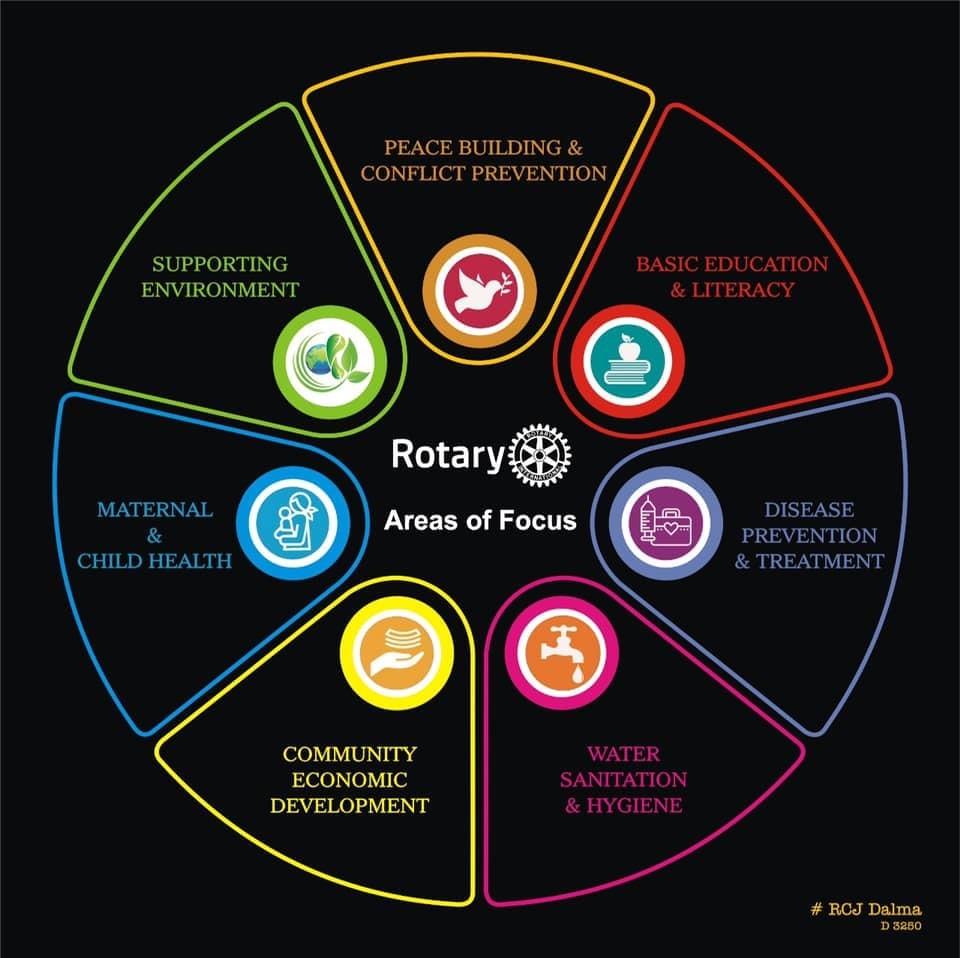
7 Areas of Rotary Service
The Trustees of The Rotary Foundation have identified seven areas of focus for the new grant structure. These areas reflect critical humanitarian issues and needs that Rotarians are addressing worldwide. They will align Rotary with other international development efforts and will strategically further the Foundation's mission.
Rotary Clubs serve communities around the world, each with unique needs and concerns. Rotarians have continually adapted and improved the way they respond to those needs, taking on a broad range of service projects. The most successful and sustainable Rotary service tends tends to fall within one of the seven following areas:
 Peace and Conflict Prevention / Resolution
Peace and Conflict Prevention / Resolution
Today, 42 million people are displaced by armed conflict or persecution. Through our partnerships with several leading universities, Rotary Peace Fellows develop the skills to strengthen peace efforts, train local leaders to prevent and mediate conflict, and support long-term peace building in areas affected by conflict. We provide up to 100 peace fellowships per year at Rotary Peace Centers. (July 2014)
The Foundation enables Rotarians to promote the practice of peace and conflict prevention/ resolution by:
1. Training leaders, including potential youth leaders, to prevent and mediate conflict
2. Supporting peace-building in communities and regions affected by conflict
3. Supporting studies for career-minded professionals related to peace and conflict prevention/resolution
Disease Prevention and Treatment
More than 100 million people are pushed into poverty each year because of medical costs. We aim to improve and expand access to low-cost and free health care in underdeveloped areas. Our members educate and mobilize communities to help prevent the spread of major diseases such as polio, HIV/AIDS, and malaria. Many of our projects ensure that medical training facilities are located where the workforce lives. (July 2014)
The Foundation enables Rotarians to prevent disease and promote health by:
1. Improving the capacity of local health care professionals
2. Promoting disease prevention programs, with the goal of limiting the spread of communicable diseases and reducing the incidences of and complications from non-communicableiseases
3. Enhancing the health infrastructure of local communities
4. Educating and mobilizing communities to help prevent the spread of major diseases
5. Preventing physical disability resulting from disease or injury
6. Supporting studies for career-minded professionals related to disease prevention and treatment
Water and Sanitation
More than 2.5 billion people lack access to adequate sanitation facilities. At least 3,000 children die each day from diarrheal diseases caused by unsafe water. Our projects give communities the ability to develop and maintain sustainable water and sanitation systems and support studies related to water and sanitation. (July 2014)
The Foundation enables Rotarians to ensure that people have sustainable access to water and sanitation by:
1. Providing equitable community access to safe water, improved sanitation, and hygiene
2. Strengthening the ability of communities to develop, fund and maintain sustainable water and sanitation systems
3. Supporting programs that enhance communities' awareness of the benefits of safe water, sanitation and hygiene
4. Supporting studies for career-minded professionals related to water and sanitation
Maternal and Child Health
At least 7 million children under the age of five die each year due to malnutrition, poor health care, and inadequate sanitation. To help reduce this rate, we provide immunizations and antibiotics to babies, improve access to essential medical services, and support trained health care providers for mothers and their children. Our projects ensure sustainability by empowering the local community to take ownership of health care training programs. (july 2014)
The Foundation enables Rotarians to improve the health of mothers and their children by:
1. Reducing the mortality and morbidity rate for children under the age of five
2. Reducing the maternal mortality and morbidity rate
3. Improving access to essential medical services, trained community health leaders, and health care providers for mothers and their children
4. Supporting studies for career-minded professionals related to maternal and child health
Basic Education and Literacy
Sixty-seven million children worldwide have no access to education and more than 775 million people over the age of 15 are illiterate. Our goal is to strengthen the capacity of communities to support basic education and literacy, reduce gender disparity in education, and increase adult literacy. (July 2014)
The Foundation enables Rotarians to ensure that all people have sustainable access to basic education and literacy by:
1. Involving the community to support programs that strengthen the capacity of communities to provide basic education and literacy to all
2. Increasing adult literacy in communities
3. Working to reduce gender disparity in education
4. Supporting studies for career-minded professionals related to basic education and literacy
Economic and Community Development
Nearly 1.4 billion employed people live on less than $1.25 a day. We carry out service projects that enhance economic and community development and develop opportunities for decent and productive work for young and old. We also help strengthen local entrepreneurs and community leaders, particularly women, in impoverished communities.
The Foundation enables Rotarians to invest in people by creating sustainable, measurable, and long -term economic improvements in their communities and livelihoods by:
1. Building the capacity of entrepreneurs, community leaders, local organizations, and community networks to support economic development in impoverished communities
2. Developing opportunities for productive work
3. Reducing poverty in underserved communities
4. Supporting studies for career-minded professionals related to economic and community development
Environment
Supporting the environment becomes Rotary's seventh area of focus. It joins peacebuilding and conflict prevention; disease prevention and treatment water, sanitation, and hygiene. RI past President Ian Riseley is the chair of the Environmental Issues task force, which he has championed the new area of focus.

.png)












